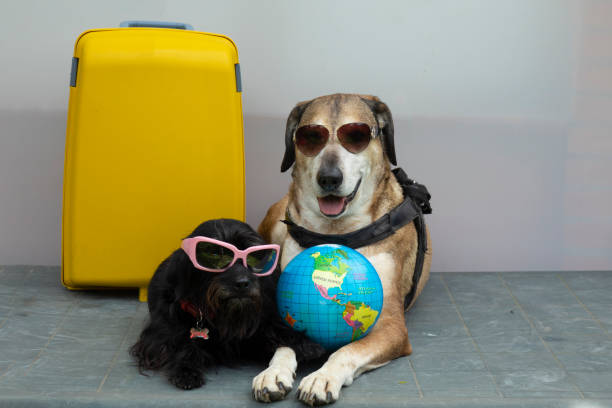
Dog Breeds That Are Born to Travel: Natural Explorers on Four Paws
Discover the dog breeds genetically and temperamentally wired for adventure. Learn which natural explorers thrive on travel, their unique traits, and how to prepare them for journeys near and far.
🐶 Pet Star
29 min read · 20, Jul 2025

Introduction: The Allure of Traveling with a Dog
Traveling with a dog can transform an ordinary trip into an extraordinary adventure. But not all dogs share the same enthusiasm or adaptability for life on the move. Some breeds are literally born to travel — bred over generations for exploration, endurance, and curiosity. These natural explorers thrive outside the comfort zone, embracing new environments with energy and enthusiasm.
Understanding which dog breeds are inherently suited to travel is essential for any pet owner planning frequent trips. These breeds are not only physically capable of handling the rigors of travel but possess the mental stamina, sociability, and resilience needed to adapt to varied situations. From rugged mountain trails to bustling cities, travel-savvy dogs can become the ultimate companions on your journeys.
In this article, we delve into the top dog breeds that are born to travel. We explore their history, temperament, physical attributes, and tips to ensure safe, enjoyable travel experiences. Whether you’re a hiker, road-tripper, or globetrotter, these dogs are natural partners in adventure.
Understanding the Traits of a Natural Traveler Dog
Before exploring specific breeds, it’s important to understand the core traits that define dogs naturally suited for travel.
1. High Energy and Endurance
Travel often involves long walks, hikes, and active days. Dogs bred for travel typically have high energy levels and excellent stamina. This trait is critical for maintaining enthusiasm and physical capability through demanding travel schedules.
2. Adaptability
Natural traveler dogs adapt quickly to new environments, noises, people, and schedules. They are less likely to experience travel anxiety or stress.
3. Sociability
A travel companion dog should be sociable and friendly with strangers, other dogs, and new experiences. This trait ensures smoother interactions in airports, hotels, and parks.
4. Intelligence and Trainability
Smart dogs who learn commands and rules quickly can navigate travel challenges more easily, from car rides to plane travel etiquette.
5. Size and Portability
While not a strict requirement, the size of the dog influences travel convenience. Some travelers prefer smaller breeds easier to carry, while others seek larger breeds built for rugged exploration.
Top Dog Breeds Born to Travel
1. Siberian Husky: The Arctic Explorer
The Siberian Husky’s heritage as a sled dog in harsh Arctic conditions equips it with incredible endurance, resilience, and a love of adventure.
- History and Traits: Originally bred by the Chukchi people in Siberia, Huskies are famous for their stamina and work ethic.
- Travel Compatibility: Huskies excel in outdoor travel such as hiking, camping, and even snow trekking.
- Challenges: Huskies are known escape artists and require secure containment when traveling.
- Tips: Provide regular exercise breaks during travel to manage their high energy.
2. Labrador Retriever: The Friendly Explorer
Labs are widely recognized for their easy-going nature and adaptability, making them ideal travel companions.
- History and Traits: Bred as fishing and hunting assistants, Labs have a natural love for water and outdoor activities.
- Travel Compatibility: Their sociable, calm demeanor adapts well to urban travel and extended trips.
- Challenges: Labs need mental stimulation and exercise to avoid restlessness on the road.
- Tips: Bring interactive toys and plan plenty of exercise stops.
3. Border Collie: The Intelligent Wanderer
Border Collies are among the most intelligent dog breeds, with an unquenchable curiosity and energy perfect for active travel.
- History and Traits: Bred for herding sheep, Border Collies have sharp minds and agility.
- Travel Compatibility: They thrive on exploration and problem-solving challenges during travel.
- Challenges: Without adequate mental and physical exercise, they can develop destructive behaviors.
- Tips: Incorporate training sessions and puzzle games during travel breaks.
4. Australian Shepherd: The Agile Nomad
Australian Shepherds combine energy, intelligence, and adaptability, making them excellent travel dogs for outdoor enthusiasts.
- History and Traits: Despite their name, they originated in the western United States as ranch dogs.
- Travel Compatibility: Highly trainable and eager to explore, Aussies excel at hiking, running, and camping.
- Challenges: Require consistent exercise and mental engagement.
- Tips: Use harnesses for secure hiking and maintain routine.
5. Jack Russell Terrier: The Small but Mighty Explorer
Don’t underestimate this small breed’s zest for travel and adventure.
- History and Traits: Bred for fox hunting, Jack Russells have high energy and fearless personalities.
- Travel Compatibility: Their small size and bold nature make them great for city travel and hikes.
- Challenges: Their energy requires close supervision to prevent escape or mischief.
- Tips: Use secure leashes and plenty of outlets for exercise.
6. Bernese Mountain Dog: The Gentle Giant Explorer
This large breed balances strength with a calm, loving nature, ideal for those seeking a travel companion who is both robust and gentle.
- History and Traits: Originating in the Swiss Alps, Bernese Mountain Dogs were farm helpers and draft dogs.
- Travel Compatibility: They enjoy outdoor travel but require consideration due to their size and heat sensitivity.
- Challenges: Prone to overheating; not suited for hot climates.
- Tips: Plan travel in cooler seasons and allow frequent rest.
7. Dachshund: The Determined Traveler
Despite their short legs, Dachshunds have a curious spirit and can adapt well to travel.
- History and Traits: Bred to hunt badgers, they have courage and persistence.
- Travel Compatibility: Their small size makes them ideal for urban travel and road trips.
- Challenges: Their long backs are vulnerable to injury.
- Tips: Use supportive carriers and avoid strenuous hikes.
8. Weimaraner: The Adventurous Athlete
Weimaraners combine athleticism with affectionate companionship, ideal for active travelers.
- History and Traits: Bred in Germany for hunting large game, they have high endurance.
- Travel Compatibility: Suited for hiking, running, and exploring new terrain.
- Challenges: High exercise needs require planning.
- Tips: Engage in vigorous exercise before travel.
9. Alaskan Malamute: The Arctic Trailblazer
Like the Siberian Husky, the Malamute’s heritage makes it a natural travel companion for cold and rugged adventures.
- History and Traits: Developed for heavy sled pulling in Alaska.
- Travel Compatibility: Excellent for long-distance hikes and cold environments.
- Challenges: Requires lots of exercise and mental stimulation.
- Tips: Maintain regular activity breaks and hydration.
10. Vizsla: The Energetic Explorer
Vizslas are affectionate, intelligent, and energetic dogs that love the outdoors.
- History and Traits: Originating in Hungary as hunting dogs, they are known as “velcro dogs” due to their loyalty.
- Travel Compatibility: Excellent companions for active travel, including running and swimming.
- Challenges: Need lots of attention and exercise.
- Tips: Bring plenty of interactive activities for mental stimulation.
Travel-Friendly Accommodations and Destinations
Pet-Friendly Hotels and Rentals
Research and book accommodations that welcome pets. Many hotels offer dog amenities such as beds, bowls, and designated play areas.
Outdoor Destinations
National parks, beaches, and hiking trails provide ideal environments for natural explorers to thrive.
Urban Adventures
Many cities have dog parks, pet-friendly cafes, and public transport options making urban travel enjoyable for dogs.
Benefits of Traveling with a Natural Explorer Dog
Traveling with a dog bred for adventure offers numerous benefits:
- Improved Physical Health: Regular activity during travel maintains fitness.
- Mental Stimulation: New environments stimulate their intellect and reduce boredom.
- Strengthened Bond: Shared experiences deepen human-canine connections.
- Socialization: Interaction with people and other animals improves social skills.
Challenges and Solutions for Traveling with Dogs
Managing Anxiety and Stress
Some dogs, even natural explorers, may experience travel stress. Techniques such as calming supplements, music therapy, or gradual desensitization help.
Dealing with Weather Conditions
Adapt your travel plans according to your dog’s tolerance for heat, cold, or humidity.
Navigating Travel Restrictions
Stay informed about pet import regulations, quarantine requirements, and vaccinations for international travel.
Expert Insights on Dogs Born to Travel
Dr. Melissa Carr, Veterinarian and Canine Behaviorist:
“Breeds with a history of exploration tend to have natural resilience and curiosity, but owners must respect individual personalities and prepare accordingly.”
Jake Thompson, Professional Dog Trainer and Adventure Enthusiast:
“Training and gradual exposure to travel environments can transform most dogs into confident explorers, regardless of breed.”
Conclusion
Traveling with a dog bred for exploration is an enriching experience that blends companionship, adventure, and mutual growth. Natural explorer breeds possess unique physical and mental traits that make them ideal travel partners—whether trekking rugged trails, navigating urban landscapes, or embarking on long road trips. Their energy, adaptability, intelligence, and sociability allow them to thrive amid new sights, sounds, and challenges.
However, traveling with any dog requires thoughtful preparation, respect for their limits, and a commitment to their well-being. Understanding breed-specific needs, health considerations, and temperament ensures both safety and enjoyment throughout the journey. Equipping yourself with the right gear, training your dog for travel scenarios, and researching pet-friendly accommodations and destinations are critical steps toward successful adventures.
Moreover, the benefits of traveling with a natural explorer extend beyond physical exercise. The mental stimulation and socialization gained during travel help prevent behavioral issues and strengthen the human-canine bond. With proper planning and care, even challenges such as travel anxiety, weather extremes, or regulatory hurdles can be managed effectively.
Ultimately, the decision to travel with your dog is a deeply personal one. By choosing breeds inherently suited to life on the move and preparing them adequately, you unlock a world of possibilities for shared discovery. These natural explorers remind us that the journey itself is as rewarding as the destination. Together, you and your four-legged companion can forge lasting memories and an unbreakable partnership fueled by curiosity and adventure.
Frequently Asked Questions (Q&A)
Q1: What makes a dog breed naturally suited for travel?
A: Breeds suited for travel typically have high energy, adaptability, sociability, intelligence, and physical endurance.
Q2: Are smaller dog breeds better for travel than larger breeds?
A: Not necessarily; it depends on the owner’s travel style and the dog’s temperament, though smaller dogs can be easier to carry.
Q3: How can I prepare my dog for long road trips?
A: Gradually acclimate your dog to car rides, ensure frequent breaks for exercise, and bring familiar toys and food.
Q4: Can all dogs adapt to air travel?
A: Many dogs can adapt with training and preparation, but some breeds, especially brachycephalic ones, face health risks during flights.
Q5: What should I pack for my dog when traveling?
A: Essentials include food, water, medications, identification tags, a leash, toys, waste bags, and a first-aid kit.
Q6: How do I manage my dog’s anxiety during travel?
A: Use calming aids, maintain routines, provide comfort items, and consider professional help for severe anxiety.
Q7: Are there legal requirements for traveling internationally with a dog?
A: Yes, requirements vary but often include vaccinations, health certificates, microchips, and possible quarantine.
Q8: Which dog breeds are best for hiking and outdoor travel?
A: Breeds like Siberian Huskies, Australian Shepherds, Border Collies, and Vizslas excel in outdoor adventures.
Q9: How can I ensure my dog’s safety in unfamiliar environments?
A: Use secure leashes or harnesses, supervise closely, and be mindful of local hazards like wildlife or terrain.
Q10: What benefits do dogs gain from traveling with their owners?
A: They receive physical exercise, mental stimulation, socialization opportunities, and stronger bonds with their owners.
Similar Articles
Find more relatable content in similar Articles

How Pets Strengthen Family Bonds...
Pets are more than just compan.. Read More

Sustainable Pet Products: What to Look for in 2025...
As sustainability becomes a ce.. Read More

Vegan Pet Toys and Accessories That Last Longer...
As pet owners grow more eco-co.. Read More

How Climate Change Affects Wild and Domestic Animals...
Climate change is dramatically.. Read More
Explore Other Categories
© 2024 Copyrights by rPets. All Rights Reserved.